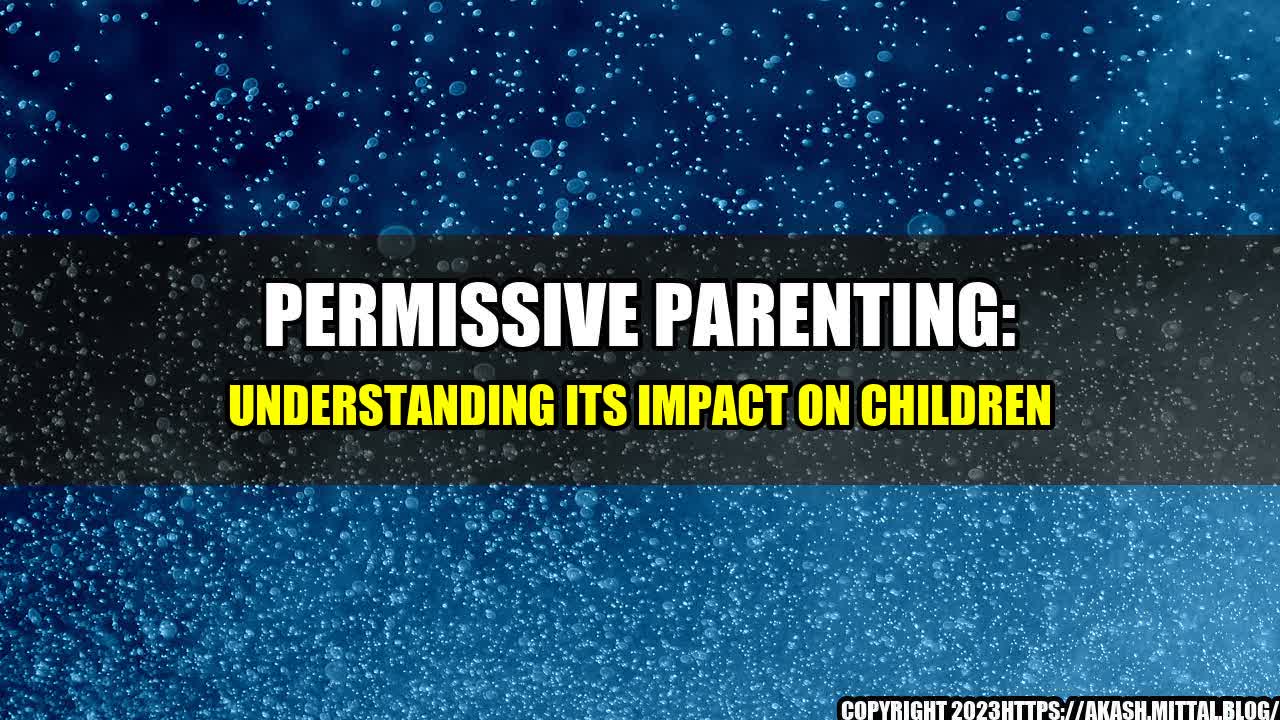When Ellen was growing up, her parents rarely set any boundaries for her. They would often let her stay up late, skip school, and eat junk food. As a result, Ellen grew up believing that everything was permissible. However, things changed when Ellen started college. She found it hard to adjust to the disciplined environment and the responsibilities that came with it. She also struggled to maintain healthy relationships because she was used to doing whatever she wanted, whenever she wanted. Eventually, Ellen realized that her parents' permissive parenting style had affected her negatively in many ways.
Permissive parenting is a style of parenting characterized by low demands and high responsiveness. Parents who adopt this style tend to be lenient and indulgent, often giving their children too much freedom without setting clear rules or consequences. They may also avoid disciplining their children, fearing that it might damage their self-esteem or relationship. While permissive parenting may have some benefits, such as fostering creativity and independence, it can also have several negative effects on children's emotional, social, and academic development.
Permissive Parenting
- According to a study published in the Journal of Developmental & Behavioral Pediatrics, children of permissive parents are more likely to have behavioural problems such as aggression, defiance, and delinquency, compared to children of authoritative (firm but fair) parents.
- Another study by the American Psychological Association found that permissive parenting was associated with lower academic achievement, lower self-esteem, and higher rates of substance abuse among adolescents.
- Research has also shown that permissive parenting can lead to a lack of emotional regulation and empathy in children, as they are not taught how to manage their emotions and respond to others' feelings.
The Impact of Permissive Parenting on Children
Permissive parenting can have both short-term and long-term consequences on children's development. Here are some examples:
Behavioural problems
Children raised with permissive parenting tend to exhibit behavioural problems such as aggression, defiance, and delinquency in both childhood and adolescence. They may struggle to follow rules and respect authority figures, leading to conflict with peers and parents.
Low self-esteem
Permissive parenting can lead to a lack of accountability and responsibility in children, as they are not held to high standards or given clear expectations. This can result in lower self-esteem as they may feel like they are not capable of achieving their goals or managing their own lives.
Poor academic performance
Permissive parenting has been linked to lower academic achievement, as children are not taught the importance of self-discipline, hard work, and setting goals. They may also lack the motivation and focus needed to succeed academically.
3 Ways to Avoid Permissive Parenting
While it's important to be responsive and nurturing to your child's needs, it's equally important to set boundaries and provide structure and discipline. Here are some practical tips:
- Set clear expectations and consequences: Be firm but fair with your child. Let them know what is expected of them and what the consequences of their actions will be. Be consistent in your discipline and follow through on your promises.
- Encourage independence and responsibility: Give your child the freedom to make choices and take risks. However, make sure that they are age-appropriate and safe. Teach them life skills and help them become self-sufficient.
- Communicate with your child: Have open and honest conversations with your child. Listen to their thoughts and feelings without judgment. Show them that you care and support them, but also hold them accountable for their actions.
Conclusion
Permissive parenting can have negative effects on children's emotional, social, and academic development. While it's important to be responsive and nurturing to your child's needs, it's equally important to set boundaries and provide structure and discipline. By setting clear expectations, encouraging independence and responsibility, and communicating with your child, you can avoid the pitfalls of permissive parenting and raise a happy and successful child.

Curated by Team Akash.Mittal.Blog
Share on Twitter Share on LinkedIn